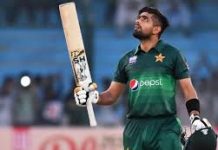A meeting of the leaders of all the Indian Occupied Jammu and Kashmir political parties with Prime Minister Narendra Modi was held in New Delhi on Thursday. This was a crucial meet with 14 leaders, including four former chief ministers, in attendance to chalk out the future political course of action in Kashmir.
Ahead of the meeting, Jammu and Kashmir Congress President Ghulam Ahmad Mir said they would raise the issue of statehood at the all-party meet convened by Prime Minister Narendra Modi. “People in the state are shocked after the developments in 2019. We’ll wait for Prime Minister Narendra Modi’s agenda for today’s meeting and respond accordingly,” he said.
Security forces in the occupied region were on high alert as Prime Minister Narendra Modi met leaders of the People’s Alliance for Gupkar Declaration (PAGD), a coalition of mainstream parties in Indian Occupied Jammu and Kashmir, in New Delhi.
Among those invited are Kashmir’s former three top elected officials — Farooq Abdullah, his son Omar Abdullah, and Mehbooba Mufti, who was a regional coalition partner of Modi’s Bharatiya Janata Party for nearly two years after the 2016 state elections.
The three and few other invited leaders were among thousands arrested and held for months in 2019. They have criticised India’s policies in Kashmir and formed an alliance with four other parties to fight them, calling them “spitefully shortsighted and unconstitutional.” The All Parties Hurriyat Conference is not part of the meeting.
“I will keep my agenda in the meeting and then talk to you,” Farooq Abdullah said before the meeting started.
Asked about PDP chief Mehbooba’s comments that India should initiate dialogue with Pakistan, the NC leader said, “Mehbooba ji is the president of her party. She has the right to speak. I have my own. I don’t want to bring in Pakistan. I am going to talk to our own prime minister.”
“If India can talk to the Taliban in Doha (Qatar), why not Pakistan,” Ms Mehbooba had said earlier.
With no agenda announced for the meeting, the leaders from Jammu and Kashmir said they have come with an open mind.
“We have not been given an agenda. We will be attending the meeting to know what the Centre is offering,” said CPI(M) leader Mohammad Yousuf Tarigami, who is also a spokesman of the six-party People’s Alliance for Gupkar Declaration (PAGD).
The meeting took place in the backdrop of the reaffirmation of a 2003 ceasefire accord between India and Pakistan in February as part of a peace deal brokered by the United Arab Emirates.
Sushant Singh, a senior fellow at the Center for Policy Research, a public policy think tank in India, in a tweet said Tuesday that the UAE-brokered backchannel talks led to “certain commitments from the Modi government on Kashmir.”
Experts say the meeting is meant to ward off mounting criticism at home and abroad after Narendra Modi’s Hindu nationalist government in August 2019 downgraded the region’s status, split it into two federal territories — Ladakh and Jammu-Kashmir — and removed inherited protections on land and jobs for the local population.
Since then, Indian authorities have imposed a slew of administrative changes through new laws, often drafted by bureaucrats, that triggered resentment and anger as many likened the moves to the beginning of settler colonialism. Modi has repeatedly called the changes overdue and necessary to foster economic development and fully integrate Kashmir with India.









